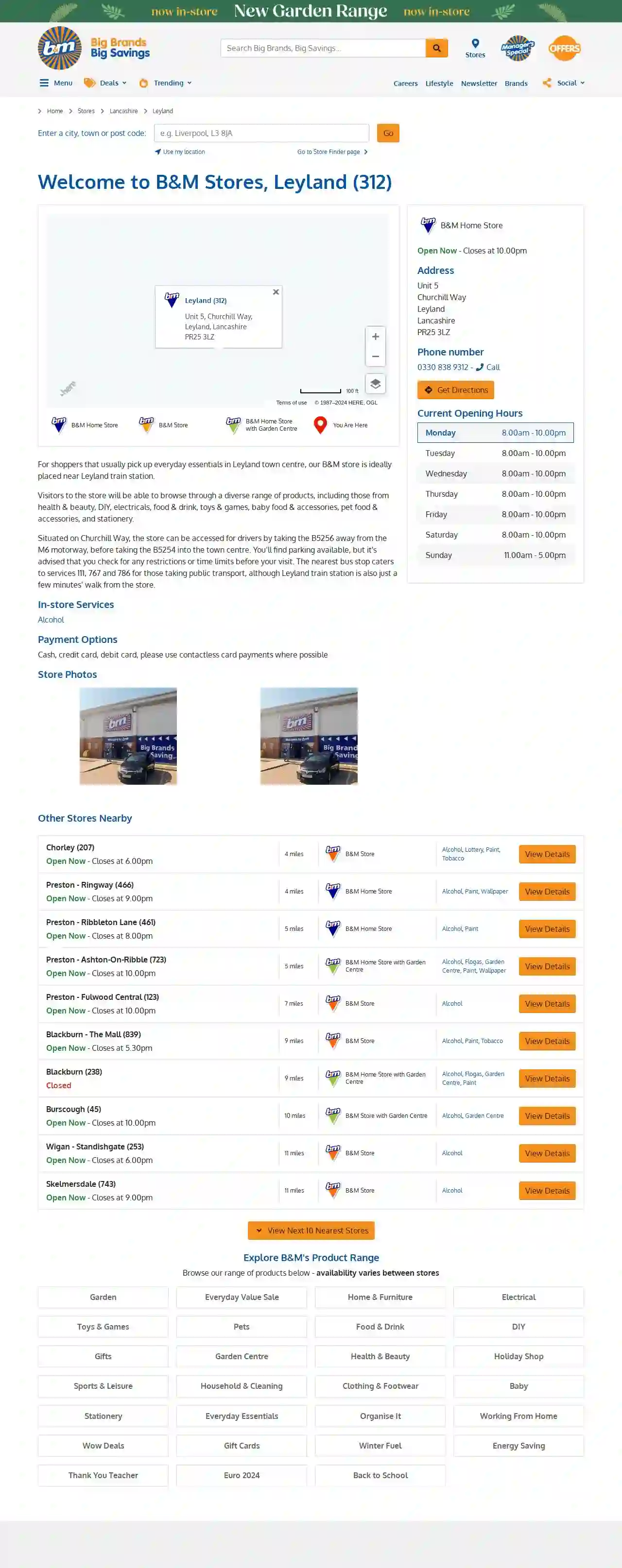HVAC Companies Whalley
Top 10 HVAC Contractor in Whalley
Get up to 3 HVAC Companies quotes for your project today! Compare profiles, reviews, accreditations, portfolio, etc... and choose the best offer.

Bluebird Refrigeration & Air Conditioning Ltd
13 reviewsSkelmersdale, GBBluebird Refrigeration is a leading provider of commercial refrigeration and air conditioning repair services throughout England and North Wales. With a team of highly skilled and experienced engineers strategically located across the country, we pride ourselves on delivering rapid call-out times and exceptional customer service. We understand the critical role that refrigeration and air conditioning play in various industries, and we are committed to ensuring that your equipment is always operating at peak performance. Whether you require immediate attention for a malfunctioning unit or need regular maintenance to prevent future issues, our team is here to help. At Bluebird Refrigeration, we take pride in our reputation for quality workmanship, reliability, and customer satisfaction. Our commitment to excellence has earned us numerous positive reviews from clients across a wide range of sectors, including butchers, bakers, produce shops, bars, clubs, coffee shops, fast food outlets, restaurants, convenience stores, supermarkets, distribution centres, factories, high street stores, garden centres, beauty therapy, fitness centres, holiday parks, and offices. We offer a comprehensive range of services, including: * Commercial Refrigeration Repair * Air Conditioning Repair * Refrigeration Servicing * Air Conditioning Servicing * Refrigeration Installation * Air Conditioning Installation Our team is equipped to handle all types of refrigeration and air conditioning systems, from small domestic units to large industrial installations. We use the latest diagnostic tools and techniques to ensure accurate and efficient repairs. Contact Bluebird Refrigeration today for a free quote and experience the difference that our expertise and commitment to customer satisfaction can make.
- Services
- Why Us?
- Gallery
Get Quote
Coolguard Refrigeration and Air Conditioning
51 reviewsChorley, Lancashire, GBCoolguard Refrigeration and Air Conditioning has over 25 years of experience in installing, repairing and servicing air conditioning and all types of refrigeration. We pride ourselves on providing a high quality service to both domestic and commercial customers. We are fully insured and F gas registered. We offer a wide range of services, including: Repairs Installations Maintenance We are committed to providing our customers with the best possible service. We offer free no obligation quotes and satisfaction is guaranteed. Contact us today to find out more about our services.
- Services
- Why Us?
- Gallery
Get Quote
Safe Flame UK
59 reviews145 Ennerdale, Skelmersdale, WN8 6AQ, GBSafe Flame UK is a gas engineering company based in Skelmersdale, serving the surrounding areas including Ormskirk, Parbold, and Wigan. We specialize in all types of gas services, including boiler and heating repair, service, installation, and maintenance, available 24/7. Our team of Gas Safe registered engineers aims to provide a quick and efficient service, often completing work on the first visit thanks to our fully stocked vans. We understand the importance of your time and safety, and we strive to minimize any hassle for our customers. We offer a 12-month guarantee on all work carried out and are confident in our expertise. If we can't fix your problem, we won't charge you a penny. Our success is built on word-of-mouth recommendations, and we are constantly looking for ways to improve our services.
- Services
- Why Us?
- Accreditations
- Gallery
Get Quote
Christie Heating Services
523 reviewsCenturian Village, Leyland, PR26 7BE, GBWe are a family-owned and operated business, with over 30 years experience working on plumbing and heating systems. We provide gas boiler service, boiler repair and boiler installation services in Leyland and all surrounding areas. We take pride in our work and strive to provide our customers with the best service possible. You can feel confident you have found a company that is reliable, trustworthy and knowledgeable. After working with large corporations for over 10 years, and our own customers for over 20 years, we understand the importance of great customer service and looking after your home. You don't just want a gas engineer, you want integrity and honesty. A boiler service can be an effective way of reducing boiler repair costs. Boilers and central heating systems are often taken for granted by homeowners, who don't realise that lots of breakdowns, leading to an expensive boiler repair, could be prevented by a regular boiler service and preventative maintenance. We work with all the well known brands, such as Worcester, Vaillant, Baxi and Ideal. We will always advise you on the most effective, cost efficient and appropriate actions that will keep your heating system operating as efficiently as possible, and for as long as possible.
- Services
- Why Us?
- Our Team
- Testimonials
- Gallery
Get Quote
B&M Home Store
4.3885 reviewsLeyland, GBB&M Stores is a leading discount retailer in the UK, offering a wide range of products across various categories, including homeware, furniture, toys, food, and more. With over 600 stores nationwide, B&M provides customers with great value for money and a convenient shopping experience. The company is committed to offering a diverse selection of products at competitive prices, catering to the needs of families and individuals alike. B&M Stores prides itself on its friendly and helpful customer service, ensuring that shoppers have a pleasant and enjoyable experience.
- Services
- Why Us?
- Accreditations
- Testimonials
- Gallery
Get Quote
SJL Heating & Plumbing
4.468 reviews18 Aycliffe Drive, Buckshaw Village, PR7 7GD, GBSJL Heating are your trusted heating and plumbing engineers in Buckshaw Village. We aim to keep you comfortable and safe all year round, whether that's by repairing your radiators or installing a new boiler into your home. We are on hand to help with all things Heating and Plumbing. We specialise in providing effective and trusted solutions to all your plumbing needs, from leaking showers to blocked pipes. Make sure your boiler and central heating system are safe by booking in your annual service with us. This not only reduces the likelihood of breakdowns but keeps your appliances running efficiently.
- Services
- Why Us?
- Gallery
Get Quote
James Hargreaves Plumbing Supplies
4.429 reviewsParliament Street, Off Todmorden Road, Burnley, BB11 3JT, GBJames Hargreaves is a trusted name in plumbing supplies, serving Burnley and the surrounding areas for over 100 years. Our Burnley branch, located on Parliament Street off Todmorden Road, is staffed by a team of friendly and knowledgeable experts ready to assist with all your plumbing needs, from small DIY projects to large-scale commercial developments. We pride ourselves on offering great value products and exceptional customer service. At James Hargreaves, we believe in providing more than just products; we offer expert advice, understanding, and assurance that comes with buying from people who truly know their stuff. Our team can guide you through a wide ranges of renewable heating solutions, helping you reduce your carbon footprint and save on energy bills. Conveniently located next door to our Burnley branch is our luxurious bathroom showroom, one of the largest in the north, showcasing displays from leading bathroom brands. We stock only the highest quality products, ensuring you get the best for your project.
- Services
- Why Us?
- Gallery
Get Quote
C-Air Filtration Ltd
4.828 reviewsAccrington, GBC-Air Filtration Ltd is a leading provider of dust and fume extraction solutions. We offer a wide range of products and services to meet the needs of businesses in a variety of industries. Our team of experts has extensive experience in designing, installing, and maintaining dust and fume extraction systems. We are committed to providing our customers with the highest quality products and services at competitive prices.
- Services
- Why Us?
- Gallery
Get Quote
Morrisons
4.1Olympian Way, Leyland, PR25 3UR, GBMorrisons is a leading UK supermarket chain with a wide range of products and services. Our Leyland store is conveniently located at Olympian Way, PR25 3UR, and is open seven days a week. We offer a variety of shopping experiences, including a traditional supermarket, a cafe, and a petrol station. Our Leyland store is committed to providing our customers with high-quality products, excellent customer service, and a pleasant shopping environment.
- Services
- Why Us?
- Gallery
Get Quote
Coolwave Solutions Ltd
521 reviewsMorecambe, GBCoolwave Solutions Ltd is a company that specializes in air conditioning installation, service, repair, and decommissioning for both residential and commercial properties. Our team takes pride in offering the most professional service, ensuring that our customers receive the highest level of installation and after-sales care. We work closely with our clients to ensure that their needs are met, and we strive to provide the most efficient and cost-effective solutions. Our team is experienced in working with various types of air conditioning systems, including Panasonic and Mitsubishi Electric, and we are committed to providing the best possible service to our customers.
- Services
- Why Us?
- Accreditations
- Our Team
- Testimonials
- Gallery
Get Quote
Over 12,692+ HVAC Contractors on our platform
Our HVAC pros operate in Whalley and beyond!
HVACCompaniesHub has curated and vetted the Best HVAC Companies in Whalley. Find a reliable pro today.
Frequently Asked Questions About HVAC Companies
- Experience: Choose a contractor with extensive experience in the HVAC industry, especially in the type of service you need.
- Licensing and Insurance: Verify that the contractor is properly licensed and insured.
- Certifications: Look for NATE (North American Technician Excellence) certification, which indicates a high level of technical competency.
- Reputation: Check online reviews and ratings to assess the contractor's reputation and customer satisfaction levels.
- References: Ask for references from past customers and contact them to inquire about their experience.
- Estimates and Quotes: Get written estimates or quotes from multiple contractors to compare pricing and services.
- Warranty Information: Ask about warranties on equipment and labor.
- Communication: Effective communication is key. Choose a contractor who responds promptly and clearly answers your questions.
- Regular Maintenance: Schedule annual HVAC maintenance to ensure your system is running at peak efficiency.
- Programmable Thermostat: Use a programmable or smart thermostat to optimize temperature settings based on your schedule.
- Seal Air Leaks: Caulk and weatherstrip windows and doors to prevent drafts.
- Proper Insulation: Ensure adequate insulation in your attic, walls, and floors to prevent heat loss in winter and heat gain in summer.
- Ventilation: Use fans strategically to circulate air and reduce reliance on AC.
- Energy-Efficient Appliances: Choose energy-efficient appliances to reduce your overall energy load.
- HVAC Zoning: Consider zoning your HVAC system to condition different areas of your home separately.
- Frequent Repairs: If your system requires repairs frequently, it may be more cost-effective to replace it.
- Age of System: HVAC systems typically last 15-20 years. If your system is nearing or beyond that age, it's likely less efficient and more prone to breakdowns.
- Increased Energy Bills: A significant rise in energy bills might mean your system is losing efficiency and needs replacement.
- Uneven Temperatures: If some rooms are too hot or too cold, it could be a sign of ductwork problems or an undersized/aging system.
- Poor Indoor Air Quality: If you're experiencing allergies, dust, or other indoor air quality issues, a new HVAC system with better filtration could help.
- Strange Noises or Smells: Unusual noises or foul odors emanating from your HVAC system could signal the need for a new HVAC system.
- AC Repair: [Price Range]
- Furnace Repair: [Price Range]
- AC Installation: [Price Range]
- Furnace Installation: [Price Range]
- Heat Pump Installation: [Price Range]
- HVAC Maintenance: [Price Range]
How do I choose the right HVAC contractor?
How can I reduce my HVAC energy consumption?
What are the signs that I need a new HVAC system?
How much do HVAC services cost?
How do I choose the right HVAC contractor?
- Experience: Choose a contractor with extensive experience in the HVAC industry, especially in the type of service you need.
- Licensing and Insurance: Verify that the contractor is properly licensed and insured.
- Certifications: Look for NATE (North American Technician Excellence) certification, which indicates a high level of technical competency.
- Reputation: Check online reviews and ratings to assess the contractor's reputation and customer satisfaction levels.
- References: Ask for references from past customers and contact them to inquire about their experience.
- Estimates and Quotes: Get written estimates or quotes from multiple contractors to compare pricing and services.
- Warranty Information: Ask about warranties on equipment and labor.
- Communication: Effective communication is key. Choose a contractor who responds promptly and clearly answers your questions.
How can I reduce my HVAC energy consumption?
- Regular Maintenance: Schedule annual HVAC maintenance to ensure your system is running at peak efficiency.
- Programmable Thermostat: Use a programmable or smart thermostat to optimize temperature settings based on your schedule.
- Seal Air Leaks: Caulk and weatherstrip windows and doors to prevent drafts.
- Proper Insulation: Ensure adequate insulation in your attic, walls, and floors to prevent heat loss in winter and heat gain in summer.
- Ventilation: Use fans strategically to circulate air and reduce reliance on AC.
- Energy-Efficient Appliances: Choose energy-efficient appliances to reduce your overall energy load.
- HVAC Zoning: Consider zoning your HVAC system to condition different areas of your home separately.
What are the signs that I need a new HVAC system?
- Frequent Repairs: If your system requires repairs often, it may be more cost-effective to replace it.
- Age of System: HVAC systems typically last 15-20 years. If your system is nearing or beyond that age, it's likely less efficient and more prone to breakdowns.
- Increased Energy Bills: A significant rise in energy bills could indicate your system is losing efficiency and needs replacement.
- Uneven Temperatures: If some rooms are too hot or too cold, it could be a sign of an inefficient HVAC system.
- Poor Indoor Air Quality: If you're experiencing allergies, dust, or other indoor air quality issues, a new HVAC system with better filtration could help.
- Strange Noises or Smells: Unusual noises or foul odors emanating from your HVAC system could signal the need for a new HVAC system.
How much do HVAC services cost?
- AC Repair: [Price Range]
- Furnace Repair: [Price Range]
- AC Installation: [Price Range]
- Furnace Installation: [Price Range]
- Heat Pump Installation: [Price Range]
- HVAC Maintenance: [Price Range]